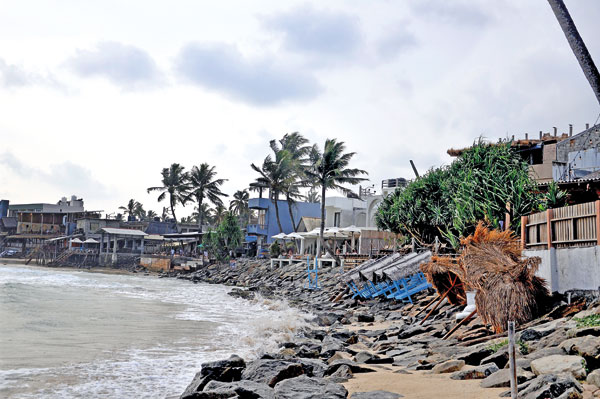News
In beachfront chaos, bribes and legal evasion keep businesses running
View(s):- The state loses tax revenue; Coast conservation regulations routinely ignored; foreigners operate businesses regardless of visa rules
- The absence of a centralised system to monitor businesses exacerbates the problem
- No response from Immigration chief, SLTDA chairman and DG to calls and emails from the Sunday Times
Tharushi Weerasinghe reporting from Ahangama
With its hip bars, sunny surf, and cerulean waters, Ahangama has quickly become one of Sri Lanka’s trendiest tourism destinations. But behind the aesthetic is a system that is struggling to keep up. Entrepreneurs—both local and foreign—say red tape, unclear visa pathways, and poor regulation are pushing even willing taxpayers into grey areas, while the state loses out on vital revenue, transparency, and jobs.
“I want to pay tax. Facilitate it,” says Randhika Sumanjana, a 29-year-old entrepreneur who started his café at age 16 and now serves up to 400 customers a day during peak season.
Mr. Sumanjana runs one of the few 100% locally owned establishments on the Ahangama beach stretch. But while his shop in front is registered as a private limited company, the restaurant itself, the higher income earner, is unregistered—caught in a bureaucratic limbo.
“The Coastal Conservation Department (CCD) and the Road Development Authority (RDA) both denied me approval,” he says. “Without those, I can’t get Tourism Board approval or register my restaurant officially.” He estimates that there are about 75 cafes in Ahangama.
The law requires constructions to be set back at least 10 metres from both the coast and the road, a spatial impossibility on much of Ahangama’s beachfront. Enforcement, however, is selective at best. Mr. Sumanjana’s café sits on a beach lined with mostly foreign-owned businesses, openly violating visa conditions and CCD and RDA regulations, directly in front of the Ahangama police station.
According to the CCD, 760 illegal structures have been identified in the Galle District alone. Of these, 23 are in Ahangama and are slated for removal.

Ahangama: Where some businesses flout the ten-metre rule. Pix by Priyanka Samaraweera
“Most tourism businesses are in clear violation—built within the 3, 8, or 10-metre buffer zones or directly on the beach and revetment,” admits CCD’s Galle Area Manager Dr. T.L.C. Vinod. The CCD has begun identifying these structures and initiating removal. If a building is found on the reservation, a police complaint is filed, and owners are given three days to appeal to the Environment Ministry. The ministry secretary has 45 days to respond; if no appeal is made, the owner must demolish the building within seven days. Failing that, CCD can lock owners out.

Randhika Sumanjana, cafe owner
The absence of a centralised record of the businesses that function in Ahangama is another issue. The Habaraduwa Divisional Secretariat has a record of 302 tourism businesses, including wellness spas and hotels, within the 14 tourism zones of Ahangama. These do not include the businesses being run by foreigners, as the DS is only mandated to keep records of sole proprietorships and businesses under the Registrar of Companies. “Only foreigners with a resident visa can run businesses anyway, and this is a Sri Lanka Tourism Development Authority (SLTDA) function we do not intervene in,” an official noted.
She noted that the DS had raised the issue with the Ministry mid-last year, submitting a list of foreign-run illegal businesses based on Grama Niladhari reports and community complaints.
The Sunday Times reached out to SLTDA Chairman Buddhika Hewawasam repeatedly for a comment but did not receive a response.
Even for foreign business owners who have jumped through the hoops and set up businesses legally, the waters are murky due to Sri Lanka’s broken visa framework for foreign investors. Since late 2024, the Department of Immigration has not issued a single business visa under the tourism category for the Ahangama region, leaving many in legal uncertainty.
“We’re in a transitional phase,” says Joseph Solo, a Lebanese national who runs a legal restaurant after a few years of navigating complex systems. While noting that the Sri Lankan community has been warm and welcoming, he noted that the lack of clarity was causing some anxiety. “I had to do visa runs and deal with changing requirements constantly, but I am waiting to see what the new policy being implemented is and will be more than happy to comply.

Lebanese businessman Joseph Solo says it took him five years to navigate the complex bureaucratic system
The Sunday Times also reached out to the Controller General of Immigration, Chaminda Pathiraja, for clarity on the visa process and potential timelines for the updated system to come in, but did not receive a response.
While the Board of Investment (BOI) offers clearer legal pathways for foreigners to start businesses, its capital thresholds are prohibitively high for most small-to-medium tourism investors.
“There’s no middle ground,” noted Prithvi Virasinghe, a local hotelier. “You’re either a major BOI investor, or you operate through workaround structures—usually with lawyers or local fronts.”
The Sunday Times found that some foreign-owned businesses operate through Sri Lankan nominee directors who hold official ownership on paper. Others host events with local charities for appearances and funnel profits through overseas accounts. Surf schools in Ahangama, for example, have been linked to international payment gateways and fundraising schemes that bypass Sri Lankan banking entirely.
But local business owners recognise the value that foreign counterparts add and want convenient, legal inclusion, not exclusion.
“Once a business is legally set up, we need to have the capacity and framework to ensure that they are regulated effectively,” Mr. Virasinghe noted. If revenue generated by tourism is not taxed or does not enter the local financial system, the country is losing a significant opportunity.
Even where checks do exist, the lack of inter-agency coordination allows non-compliance to slip through the cracks because most compliance is self-submitted. “There’s no audit system. No coordinated checks from IRD, immigration, or tourism officials.”
Several business owners propose a simple solution: require tax compliance certificates alongside business registrations, displayed publicly.
“If you’re asking for a registration to be displayed at the reception, ask for the TIN certificate too,” says Mr. Virasinghe. “Let the public hold us accountable too.”
He also noted that many businesses were willing to facilitate regulation: “If we create systems that work, many are willing to comply.”
Bringing foreign-run businesses into the formal system through efficient regulation is the way forward, agreed Samath Gammampila, who runs a popular Ahangama restaurant. “There are great business ideas we could collaborate on—if only there were mechanisms to support them. We need to encourage investors with reasonable minimum investment thresholds because, in tourism hotspots, there are so many small and medium enterprise-level investors who are functioning in grey areas.”
Operators added, however, that beyond the lack of regulation was the issue of corruption within subject matters that are regulated.
“The liquor licence process is incredibly frustrating,” said one operator who wished to remain anonymous. “It costs more to be penalised when you’re licensed than to sell without one.”
He recounted being fined Rs. 10 million after obtaining a licence through formal channels, bypassing a regional official who expected a bribe. “Because he missed out, he came after me. I had to fight it for three months while unlicensed places kept running uninterrupted. Making a ‘deal’ has become a prerequisite.”
“Getting a Sri Lanka Tourism certificate is so difficult that even the excise officials discouraged me from applying,” said another business owner. “The regulation is flawed—if I operate without a licence and get raided, I pay a Rs. 10,000 fine in court. But if I’m registered, I face higher penalties and more bureaucracy.”
Known for being a “party” destination, most tourism establishments in Ahangama, in their hundreds, serve alcohol. But based on official records obtained by the Sunday Times, only 38 of them have liquor licences. Operators claimed that local excise officials themselves encouraged bribes over actual licensing, claiming that it was more “convenient” for the business owner.
According to an area Excise Department official, Jayantha de Silva, the fee to obtain a licence for a restaurant stood at Rs. 250,000, with charges for hotels starting at Rs. 100,000 and increasing based on the number of rooms. “If you are found selling alcohol without a licence, you will be tried in court, but if a licensed seller violates a code, then they are fined for technical crimes under the department itself—in some cases, we take the licence away.” When questioned on the scale of illegal operations selling alcohol without a licence, Mr. de Silva noted that checks are done sporadically based on tip-offs.
The Sunday Times had been trying to contact SLTDA Director General Malkanthi Rajapaksha through email, phone call, the media secretary, and
her office repeatedly since the beginning of April this year but did not receive
a response.
The lack of proper zoning in places like Ahangama leads to frequent clashes between nightlife venues and hotel owners—some want to party, others need their guests to sleep. While the more recent clashes garnered police intervention and regulation, some business owners noted that conflicting business interests added to tensions in the area.
Tourism Deputy Minister Ruwan Ranasinghe stated that a zoning plan is being developed with the CCD to reduce conflicts among businesses and address environmental violations.
Acknowledging widespread concerns over foreign-run tourism businesses operating on tourist visas in Ahangama, he noted that a monitoring framework is being implemented to ensure compliance with immigration and licensing laws through periodic inspections and cross-agency coordination.
He said the government is working to deploy tourist police units to hotspots like Ahangama by the end of this year and improve transparency in licensing, particularly in response to corruption complaints within the Excise Department.
On financial regulation, he said businesses will be required to register transactions with local authorities, with incentives for linking payments to Sri Lankan banks and regular audits to curb informal cash and foreign gateway use. Timelines for these projects, however, were not confirmed.
The best way to say that you found the home of your dreams is by finding it on Hitad.lk. We have listings for apartments for sale or rent in Sri Lanka, no matter what locale you're looking for! Whether you live in Colombo, Galle, Kandy, Matara, Jaffna and more - we've got them all!

